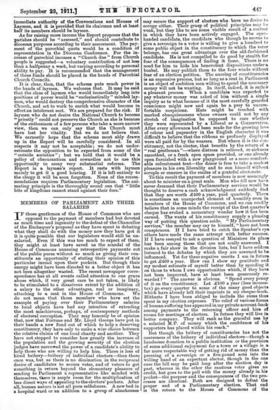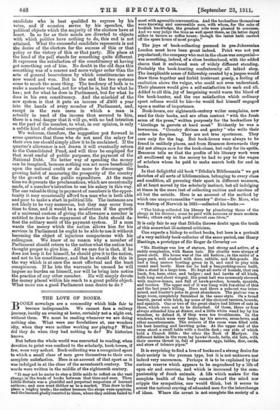MEMBERS OF PARLT A MF,NT AND THEIR SALARIES I F those
gentlemen of the House of Commons who are opposed to the payment of members had but devoted as much time and ingenuity to the defeat of the Chancellor of the Exchequer's proposal as they have spent in debating what they shall do with the money now they have got it it is quite possible that our legislators would still be un- salaried. Even if this was too much to expect of them, they might at least have saved us the scandal of the House of Commons annexing retrospective payments out of the public purse without so much as giving their con- stituents an opportunity of stating their opinion of this particular inroad upon their pockets. But though their energy might have been directed to a better object it has not been altogether wasted. The recent newspaper corre- spondence has at all events called attention to one grave abuse which, if very great care be not taken, is likely to be stimulated to a disastrous extent by the addition of a salary to the other advantages, real or imaginary, attaching to a seat in the House of Commons. We do not mean that those members who have set the example of paying over their Parliamentary salaries to local objects have had any intention of extending the most mischievous, perhaps, of contemporary methods of electoral corruption. They may honestly be of opinion that, now that Fortune and Mr. Lloyd George have put in their hands a new fund out of which to help a deserving constituency, they have only to make a wise choice between the relative claims of one local charity and another. They have not stopped to consider how greatly the increase of the population and the growing severity of the election judges have narrowed the power of a candidate's ability to help those who are willing to help him. There is less of hired bribery—bribery of individual electors—than there once was, but as there is no diminution in the reciprocal desire of candidates to secure votes, and of voters to get something in return beyond the elementary pleasure of sending to Parliament a representative like minded with themselves, there is ample room for the multiplication of less direct ways of appealing to the electors' pockets. After all, human nature is not all pure selfishness. A new bed in a hospital ward or an addition to a group of almshouses may secure the support of electors who have no desire to occupy either. Their grasp of political principles may l e weak, but they like to see some visible result of a contest in which they have been actively engaged. The epee- handed candidate, the candidate who though he scorns to give a sovereign to a voter is willing to give a hundred to some public object in the constituency to which the voter belongs, has one great advantage over the old-fashioned candidate. He is not compelled to do good by stealth for fear of the consequences of finding it fame. There is no need for him to hide his benevolent dispositions under a. bushel. He may publish them to the four winds without fear of an election petition. The nursing of constituencies is an expensive process, but so long as a seat in Parliament is an object of ambition men willing to spend the necessary money will not be wanting. In itself, indeed, it is rather a pleasant process. When a candidate was expected to pay whatever money was asked of him without a single inquiry as to what became of it the most carefully guarded conscience might now and again be a, prey to uncom- fortable suspicions. Hats might be touched with marked obsequiousness whose owners could not by any stretch of imagination be supposed to care whether they were represented by a Liberal or a Conservative. After every allowance had been made for the growing love of colour and pageantry in the English character it was difficult to believe that the ribbons so profusely displayed wero all paid for by the wearers. But where it is the con- stituency, not the elector, that benefits by the return of a " real gentleman "—where distress is relieved, or sickness smoothed, or a fresh open space provided, or one already open furnished with a new playground or a more comfort- able refreshment tent—the donor is free to take a modest pleasure in his own liberality and to sun himself without scruple or censure in the smiles of a grateful electorate. To this result the payment of members is now seemingly about to minister on a great scale. Men who till now have never dreamed that their Parliamentary services would be thought to deserve a cash acknowledgment suddenly find that they are worth £400 a year, paid quarterly. There is sometimes an unexpected element of humility even in members of the House of Commons, and we can readily believe that in some minds the receipt of the first quarter's cheque has evoked a momentary wonder how it has been earned. The wants of his constituency supply a pleasing way of putting this question aside. " My Parliamentary services," the member may say to himself, " have not been conspicuous. If I have tried to catch the Speaker's eye others have made the same attempt with better success. If I have essayed to ask a question of Ministers its place has been among those that are not orally answered. I make a fair show in the division lists, but I have seldom listened to the debates by which they are assumed to be influenced. Yet for these negative merits I am in future to get £400 a year. How can I show my gratitude and my modest estimate of myself better than by spending it on those to whom I owe opportunities which, if they have not been improved, have at least been generously re- warded ?" The answer is obvious. " Spend every penny of it on the constituency. Let £100 a, year (less income- tax) go every quarter to some of the many good objects which have already left their imprints in my cheque-book. Hitherto I have been obliged to include the sums thus spent in my election expenses. The relief of various forms of human suffering has appeared in my private account-book among payments to the returning officer and hire of rooms for meetings of electors. In future they will live in better company. They will rank as the graceful use by a salaried M.P. of money which the confidence of his supporters has placed within his reach."
But though the bribery of constituencies has not the coarseness of the bribery of individual electors—though a handsome donation to a public institution or the provision of some additional enjoyment for a town or a village is a far more respectable way of getting rid of money than the pressing of a sovereign or a five-pound note into the willing hand of an expectant elector, though in the one case the bill may be paid. long after the election day is past, whereas in the other the cautious voter gives no credit, but goes to the poll with the money already in his pocket—the purpose and the consequences of the two pro- cesses are identical. Both are designed to defeat the proper end of a Parliamentary election. That end is the return to the House of Commons of the candidate who is best qualified to express by his votes, and if occasion serves by his speeches, the political objects which the majority of the electors have at heart. In so far as their minds are diverted to objects with which politics have nothing to do, this end is not attained. What the successful candidate represents is not the desire of the electors for the success of this or that policy or the victory of this or that party. His place at the head of the poll stands for something quite different. It expresses the satisfaction of the constituency at having got something out of him. No doubt in the old days this something was of a coarser and more vulgar order than the acts of general benevolence by which constituencies are now wooed and won. But in the end the two systems come to much the same thing. The tendency of both is to make a member valued, not for -what he is, but for what he has ; not for what he does in Parliament, but for what he does in his own constituency. And the mischief of the new system is that it puts an income of X400 a year into the hands of every member of Parliament, and, except in the rare cases in which a man is actually in need of the income thus secured to him, there is a real danger that it will go, with no bad intention on the part of the member, to what, in our opinion, is only a subtle kind of electoral corruption. We welcome, therefore, the suggestion put forward in some quarters that those who do not need the salary for their own use should simply allow it to lie unclaimed. If the quarter's allowance is not drawn it will eventually return to the Consolidated Fund, and will thus be employed for that most useful of public purposes, the payment of the National Debt. No better way of spending the money can be imagined, because nothing can act more beneficially upon the national credit or do more to discourage the growing habit of measuring the prosperity of the country by the growth of the public expenditure. At the same time we deprecate the proclamations, which are occasionally made, of a member's intention to use his salary in this way. The one valuable thing in payment of members is the oppor- tunity it may occasionally afford to a man who is both able and poor to make a start in political life. The instances are not likely to be very numerous, but they may occur from time to time, and it would be a misfortune if the growth of a universal custom of giving the allowance a member is entitled to draw to the repayment of the Debt should de- feat the solitary merit of the payment system. If a man wants the money which the nation allows him for his services in Parliament he ought to be able to use it without becoming the object of injurious comparisons with his colleagues. We know of no reason why a member of Parliament should return to the nation what the nation has thought proper to give him. All we care for is that, if he does not keep it for himself, he should give it to the nation, and not to his constituency, and that he should do this in the way which is at once the most effectual and the least conspicuous. If he lets the warrants be unused he will impose no burden on himself, nor will he bring into notice the practice of any other member. He will simply devote the money placed within his reach to a great public object. What more can a good Parliament man desire to do ?







































 Previous page
Previous page